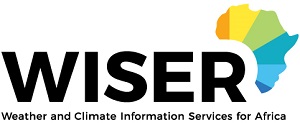Title
Introduction
The Weather and Climate Information Services for Africa (WISER) was conceived by DfID in 2015 to stimulate the uptake of climate information by policy makers and vulnerable groups including the youth and women. The thinking behind establishment of WISER is made clear by the following extract from the WISER business case:
Africa’s increasingly variable weather and climate threatens development. Agriculture and food security, water, energy, infrastructure, and health are already sensitive to weather related shocks. Rising temperatures, changing rainfall patterns and climate-related disasters (especially floods and droughts) will erode gains in poverty reduction and set back economic development.
WISER is composed of two components:
- The East Africa component whose implementation is led by the UK Met-Office
- The Pan Africa component led by ACPC
The objectives of the WISER pan-Africa component are:
- Strengthen the governance and enabling environment for climate information services uptake and use in Africa, including evidence on impact, donor coordination, protocols for sharing data
- ACPC’s set up and first grants under Climate Research for Development (CR4D) (up to 6 grants to a maximum total value of $3m) for delivery in the period to December 2016
- Support a fellowship programme (particularly where such fellowships link to CR4D or sub-grant projects)
- Developing partnerships to the AGN and improve awareness and access to CIS among African youth, women and parliamentarians
In order to deliver on the foregoing objectives, knowledge management (KM) is an important link to facilitate harnessing information and knowledge and to ensure channeling to beneficiaries across the African continent. Further, KM has to work closely with the communications efforts to ensure that climate information and knowledge address specific needs of beneficiaries, and are delivered in a timely manner, in the right language and format, and using the most efficient dissemination channels.
During this early stage of WISER activities, the ACPC is developing both a partnership framework and a strategy to guide the KM work within the pan-Africa WISER component.
Objectives
The following are the objectives of the KM workshop:
- Convene key WISER pan-Africa and East Africa KM partners, including knowledge networks and beneficiaries, to agree on modalities for a knowledge collaboration partnerships
- Lessons sharing from participants representing climate information and development KM functions, in both the pan-Africa and East Africa WISER components
- Identify the key elements of a KM strategy for supporting a robust CIS delivery
- Led by the East Africa component, discuss the knowledge management implications of CIS co-production
- On basis of stakeholder mapping by the pan-Africa component, explore a mechanism for identification of knowledge gaps, in line with the needs of climate information beneficiaries in Africa
Expected Results
- Increased understanding of the role of KM and communications in decision making
- Practical perspectives of KM implementation at different scales shared
- User knowledge needs identification, contextualization and dissemination approaches shared
- Collaboration and partnership approaches and principles better understood, and foundation for partnership laid
- Better understanding of challenges encountered by climate knowledge purveyors in accessing, organizing and sharing knowledge
- Validation of the WISER pan-Africa KM strategy
- Roadmap for creation of an enabling environment for KM in Africa
Structure
The WISER KM workshop will be held on the 24-26 May 2017 in Addis Ababa, Ethiopia. The three-day event will consist of open moderated discussions and presentations by selected climate knowledge practitioners from both the East Africa and pan-Africa components of WISER, who will share lessons, opportunities and challenges their institutions have encountered.
KM representatives from WISER (both Pan-Africa and East Africa) implementing partners, Met services in Africa, RCCs and other actors will also share their understanding of the CIS landscape, including KM needs and challenges.
Breakout sessions will be used to facilitate group work on Africa’s climate information and knowledge needs, KM challenges and potential KM partnerships across the continent.
